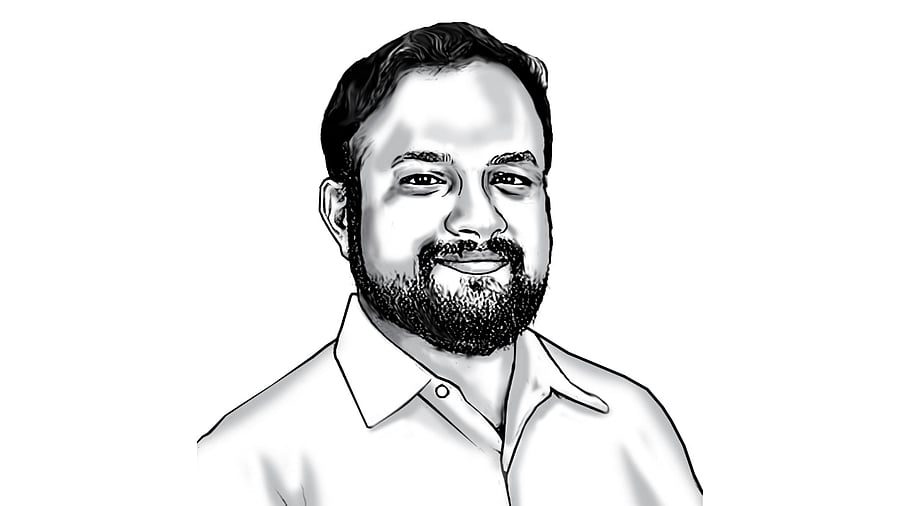
As America marks the anniversary of the January 6 attack on the Capitol by the supporters of former President Donald Trump, it is a good time to reflect on a similar attack on the Indian Parliament. No, not the one in 2001, but the one that took place in November 1966.
Mobilised by the Jana Sangh, RSS, Hindu Mahasabha and other militant Hindu organisations, a rally to demand a national law banning cow slaughter turned violent at the urging of Swami Rameshwaranand, who egged on the mob to storm Parliament. Eight people were killed, hundreds injured and public property worth crores was damaged as thousands of rioters stormed the Parliament building.
It is interesting to look back at this event in 2022 -- at a time when the BJP is in its second term, with a full majority in the Lok Sabha, having made no attempt to pass a national law banning cow slaughter. Part of this may be because such a law would relate to animal husbandry and thus can only be made by state legislatures, but when have constitutional imperatives and niceties stopped the Modi government from doing whatever it wants to do.
While BJP-ruled states have imposed harsh bans on cow slaughter and beef consumption, it is also true that as the BJP seeks to expand its footprint across the country, it has been forced to acknowledge that such positions won’t help it outside the Hindi heartland. On the contrary, BJP candidates in places like Goa, Kerala and Meghalaya have promoted beef consumption in their respective states as part of election promises.
Hypocrisy over cow slaughter is nothing new in Indian politics. One only has to read the Rani of Jhansi’s Australian lawyer John Lang’s Wanderings in India, in which he casts a keen but sympathetic eye over Indian society just prior to the 1857 revolt, and calls a spade a spade – or rather, the issue of the cow politics rather than religion, as his Bengali Brahmin friend Nobinkissen explained to him.
Cow slaughter was an issue that came up repeatedly in the Constituent Assembly and there, too, the confusion and hypocrisy were evident. As far back as 1947 itself, there was a demand that a cow slaughter ban should be made a fundamental right, though eventually, even the right-wing members of the Congress accepted the ‘compromise’ that it would be a ‘directive principle of state policy’ -- not a legal mandate but a goal the government ought to work toward.
While there is an occasional attempt to offer an economic justification for laws banning cow slaughter, it is evident that what motivated Hindu members of the Constituent Assembly such as Shibban Lal Saxena, Pandit Thakurdas, Seth Govind Das and others is religious feeling. This was called out by the Muslim members of the Constituent Assembly, notably, Zahir ul Hassan Lari and Syed Mohammed Sa’adulla. While they did not object to the presence of a clause relating to cow slaughter in the Constitution, they highlighted and refuted the tortured justifications, including economic, being offered to advance what was essentially a Hindu agenda. As Lari put it succinctly, “Let there not linger an idea in the mind of the Muslim public that they can do one thing, though in fact they are not expected to do that.”
The most scathing response to Article 48 was from Frank Antony, in a speech delivered after the Constitution had been finalised:
“What I resent in this Directive Principle is the insidious way in which this provision with regard to the banning of cow slaughter has been brought in. It was not there before. I cannot help saying that those fanatics and extremists who could not bring in this provision through the front door have succeeded in bringing it through the back door. Sir, I am not a beef-eater; I am not holding a brief for beef-eaters. I say, you may ban cow slaughter, but we should have done it honestly, without our tongues in our cheeks, without resorting to methods which may give rise to the accusation of subterfuge.”
The hypocrisy that galled Antony and others was that the makers of the Constitution of India would claim it to be secular and protective of minority rights but still give leeway to the majority community to impose its values on them, whenever they felt like it.
No religion is free of hypocrisy and no Constitution is without contradictions. Both truths are evident when we see Article 48 of the Constitution of India and its convoluted history.
Watch the latest DH Videos here: